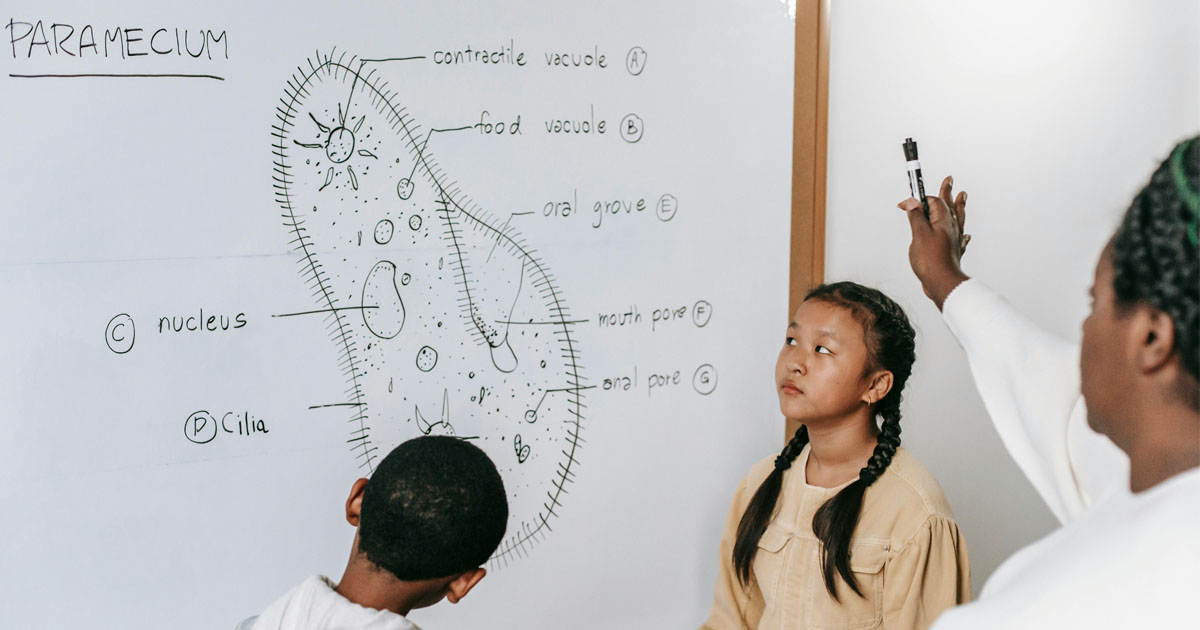Best Biology Online Tutors From India
Biology is a fascinating subject that helps students understand living organisms, their functions, and interactions with the environment. At Guru At Home, we understand that every student has unique learning needs when it comes to mastering biology. Our experienced tutors from India provide personalized online biology tuition to help students across all UK key stages improve their understanding of biological concepts and achieve academic success.
Why Choose Indian Biology Tutors Online?
Our tutors bring several advantages to your child’s biology education:
- Strong Scientific Foundation: India's education system places significant emphasis on sciences, producing skilled biology educators.
- Affordable Excellence: High-quality online biology tuition from India offers excellent value without compromising on educational standards.

- Comprehensive Knowledge: Our tutors are well-versed in the UK biology curriculum requirements.
- Unique Teaching Methods: Indian biology tutors often employ alternative approaches that can help students understand complex biological concepts from different perspectives.
- Flexible Scheduling: Online biology classes from India accommodate various time zones, making it easier to find suitable lesson times.
UK Biology Curriculum by Key Stage
Indian Biology tutors are known for their clear, structured teaching style that makes even complex topics easier to understand. From cell biology and human anatomy to genetics and ecosystems, they cover the full UK curriculum with a focus on key concepts and exam techniques. Many of these tutors have a strong academic background and tailor lessons to suit the student’s Key Stage level and individual learning pace. With the flexibility of online sessions, they provide consistent support in a comfortable learning environment. Their guidance helps UK students build a solid understanding of Biology and improve their performance in tests and exams.
Chapter: Plants
- Identifying and naming common plants
- Basic structure of plants (roots, stems, leaves, flowers)
- Observing seasonal changes in plants
Chapter: Animals Including Humans
- Identifying and naming common animals including fish, amphibians, reptiles, birds, and mammals
- Basic classification of animals (carnivores, herbivores, omnivores)
- Human body parts and senses
Chapter: Living Things
- Exploring differences between things that are living, dead, and never lived
- Observation of local environment to identify living things
- Introduction to habitat
Chapter: Seasonal Changes
- Observing changes across the four seasons
- Weather patterns and day length variations
Chapter: Living Things and Their Habitats
- Exploring and comparing differences between living, dead, and non-living things
- Identification of local habitats and the animals and plants found there
- Identifying local habitats and the animals and plants found in them
- Simple food chains
Chapter: Plants
- Observing how seeds and bulbs grow into mature plants
- Plant requirements for growth and survival (water, light, suitable temperature)
- Understanding the requirements for plant growth and survival (water, light, and suitable temperature)
Chapter: Animals Including Humans
- Basic needs of animals for survival (water, food, air)
- Importance of exercise, balanced diet, and hygiene for humans
- Introduction to life cycles and reproduction in animals
Chapter: Materials in Living Things
- Properties of materials used by living things
- How materials change in different environments
Chapter: Plants
- Functions of different plant parts
- Requirements for plant life and growth
- Water transportation in plants
- Life cycle of flowering plants (pollination, seed formation, seed dispersal)
Chapter: Animals Including Humans
- Nutrition and balanced diets
- Skeletons and muscles – their functions and importance
- Comparison of animal skeletons
Chapter: Living Things
- Classification of living things in local environments
- Environmental changes and their effects on living things
Chapter: Rocks and Soils in Ecosystems
- How soil supports plant life
- Role of decomposers in soil formation
Chapter: Living Things and Their Habitats
- Classification of living things using identification keys
- Environmental changes and dangers to living things
- Local and wider environment exploration
Chapter: Animals Including Humans
- Digestive system and its functions
- Types of teeth in humans and their functions
- Food chains – producers, predators, and prey
Chapter: States of Matter in Living Systems
- Water cycle and its importance to living organisms
- How materials change state in biological processes
Chapter: Sound in Animals
- How animals produce and receive sounds
- Animal communication
Chapter: Living Things and Their Habitats
- Life cycles of mammals, amphibians, insects, and birds
- Reproduction processes in plants and animals
- Work of naturalists and animal behaviorists
Chapter: Animals Including Humans
- Human development from birth to old age
- Physical changes through puberty
- Gestation periods in different animals
Chapter: Properties and Changes in Living Things
- How materials change during digestion
- Reversible and irreversible changes in cooking
Chapter: Earth and Space in Ecosystems
- How day length affects plants and animals
- Seasonal behaviors in animals (migration, hibernation)
Chapter: Living Things and Their Habitats
- Classification of living things based on observable characteristics
- Linnaean system of classification
- Microorganisms, plants, and animals
Chapter: Animals Including Humans
- Human circulatory system – functions of heart, blood vessels, blood
- Impact of diet, exercise, drugs, and lifestyle on body function
- Transportation of nutrients and water within animals and plants
Chapter: Evolution and Inheritance
- Fossil evidence for evolution
- How living things change over time
- Offspring variation and adaptation
- Darwin’s theory of evolution
Chapter: Light in Living Things
- How eyes function and detect light
- How plants respond to light
Chapter: Cells and Organisation
- Plant and animal cellular structure
- Functions of cellular components
- Unicellular organisms
- Hierarchical organisation in multicellular organisms
Chapter: The Skeletal and Muscular Systems
- Structure and function of the human skeleton
- Biomechanics – interaction of skeleton and muscles
- Movement mechanisms
Chapter: Reproduction
- Reproductive systems in humans
- Pregnancy and birth
- Plant reproduction – flowers, pollination, fertilisation, seed dispersal
Chapter: Ecosystems
- Interactions between organisms
- Food webs and chains
- Classifications of organisms
- Biodiversity and human impacts
Our online biology tutor KS3 program is designed to build a solid foundation at this crucial transition point.
Chapter: Health and Nutrition
- Content of a healthy diet
- Calculations of energy requirements
- Consequences of imbalanced diets
- Digestive system structure and function
- Enzymes and their roles in digestion
Chapter: Gas Exchange Systems
- Structure and function of the human gas exchange system
- Mechanisms of breathing
- Impact of exercise, asthma, and smoking
Chapter: Cellular Respiration
- Aerobic and anaerobic respiration
- Energy in organisms
- Response to exercise
Chapter: Photosynthesis
- Process and word equation
- Leaf adaptations
- Limiting factors
- Plant mineral requirements
Chapter: Genetics and Evolution
- Inheritance and DNA structure
- Genetic variation
- Natural selection
- Extinction
- Biodiversity importance
Chapter: Disease and Immunity
- Communicable diseases
- Pathogens and transmission
- Immune system
- Antibiotics and painkillers
- Development of medicines
Chapter: Adaptation and Competition
- Competition in animals and plants
- Adaptations for survival
- Environmental changes and distribution of organisms
Chapter: Interdependence and Food Webs
- Predator-prey relationships
- Carbon and water cycles
- Bioaccumulation
- Impacts of environmental change
Chapter: Cell Biology
- Cell structure and function
- Cell division – mitosis and meiosis
- Transport in cells – diffusion, osmosis, active transport
- Cell specialisation and differentiation
- Stem cells and their applications
Chapter: Organisation and Body Systems
- Principles of organisation
- Digestive system and enzymes
- Heart and circulatory system
- Health implications of lifestyle
- Plant tissues and organ systems
Chapter: Infection and Response
- Communicable diseases
- Viral, bacterial, fungal, and protist diseases
- Human defence mechanisms
- Vaccination
- Antibiotics and drug development
- Plant diseases and responses
Chapter: Bioenergetics
- Photosynthesis process and limiting factors
- Adaptations for photosynthesis
- Uses of glucose from photosynthesis
- Respiration – aerobic and anaerobic
- Response to exercise
- Metabolism
Chapter: Homeostasis and Response
- Homeostasis principles
- Nervous system structure and function
- Hormonal coordination
- Control of blood glucose
- Menstrual cycle hormones
- Contraception methods
- Treating infertility
- Plant responses and hormones
Chapter: Inheritance, Variation and Evolution
- Reproduction – sexual and asexual
- DNA structure and protein synthesis
- Genetic inheritance and diseases
- Variation and evolution
- Selective breeding and genetic engineering
- Cloning
- Theory of evolution and speciation
- Classification systems
Chapter: Ecology
- Adaptations, interdependence and competition
- Organisation of ecosystems
- Materials cycling
- Biodiversity importance
- Human impacts on ecosystems
- Waste management
- Land use and deforestation
- Global warming
- Maintaining biodiversity
Chapter: Examination Preparation
- Scientific method and investigation skills
- Data analysis and evaluation
- Experimental design
- Application of knowledge to unfamiliar contexts
The focus in Year 11 is on consolidation, application of knowledge to complex problems, and preparation for GCSE examinations.
Chapter: Biological Molecules
- Carbohydrates, lipids, proteins
- Enzyme action and inhibition
- DNA and RNA structure
- DNA replication
- ATP structure and function
- Water and inorganic ions
Chapter: Cells and Immune System
- Cell structure and microscopy
- Cell fractionation and ultrastructure
- Cell cycle and division
- Transport across cell membranes
- Immune system – specific and non-specific responses
- Antibody structure and function
Chapter: Exchange and Transport
- Surface area to volume ratio
- Gas exchange systems
- Circulatory systems
- Transport in plants
- Transpiration and translocation
Chapter: Genetic Information and Variation
- DNA, genes, and chromosomes
- Protein synthesis
- Genetic diversity
- Species and taxonomy
- Biodiversity measurement
Chapter: Energy Transfers
- Photosynthesis – light-dependent and light-independent reactions
- Respiration – glycolysis, link reaction, Krebs cycle, oxidative phosphorylation
- Energy and ecosystems
- Nutrient cycles
Chapter: Organisms’ Response to Environment
- Survival and response
- Receptors
- Control of heart rate
- Nerve impulses
- Synaptic transmission
- Muscle contraction
- Homeostasis mechanisms
Chapter: Genetics, Populations and Evolution
- Inheritance patterns
- Population genetics
- Evolution and speciation
- Cloning and biotechnology
- Genomics and gene technologies
Chapter: Control of Gene Expression
- Mutations
- Gene expression control
- Cancer as uncontrolled cell division
- Genome projects
- Gene technologies in diagnosis and treatment
- Ethical considerations in genetic technologies
Our Qualified Indian Biology Tutors
At Guru At Home, we take pride in our exceptional team of biology tutors from India who specialize in teaching the UK curriculum. Our tutors represent the very best of India’s strong scientific tradition and bring unique insights to help UK students excel.
Academic Excellence
Our biology tutors are selected based on rigorous criteria:
- Advanced Degrees: Minimum Bachelor’s degree in Biology or Life Sciences, with many holding Master’s degrees or PhDs from prestigious Indian institutions like IITs, NITs, and other renowned universities.
- Specialized Training: Additional pedagogical qualifications in teaching biology effectively.
- UK Curriculum Certification: Specific training and certification in UK curriculum requirements and examination formats.
- Continuous Professional Development: Regular updating of skills through workshops and advanced courses.

Extensive Teaching Experience
Our Indian biology tutors have:
- Minimum 3-5 Years: All tutors have substantial experience teaching biology to students at various levels.
- UK Curriculum Focus: Specific experience teaching UK curriculum biology to British students.
- Examination Preparation: Proven track record of helping students succeed in SATs, GCSEs, and A-Levels.
- Diverse Student Experience: Experience working with various learning styles and abilities, including gifted students and those with learning challenges.
Cultural Advantages
Indian biology tutors online bring unique cultural perspectives that enhance learning:
- Rich Scientific Heritage: India’s extensive tradition in natural sciences and medicine.
- Alternative Approaches: Different methods for understanding biological concepts, offering students new ways to grasp difficult topics.
- Practical Application Focus: Connecting theoretical knowledge to real-world applications.
- Holistic Understanding: Emphasis on seeing connections between different biological systems and processes.
Technological Proficiency
Our tutors excel in the digital learning environment:
- Advanced Online Tools: Proficiency with interactive whiteboards, digital models, and educational software.
- Multimedia Teaching: Using animations, simulations, and visualizations to explain complex biological processes.
- Resource Creation: Developing custom digital worksheets, quizzes, and practice materials.
- Technical Troubleshooting: Ensuring smooth lesson delivery regardless of technical challenges.

Benefits of Online Biology Classes from India
Our Indian biology tutors online bring exceptional value to students studying the UK curriculum:
1. Personalized Learning Experience
Every student has unique strengths and areas for improvement. Our tutors develop customized learning plans that address individual needs, ensuring that students build solid biological foundations.
2. Interactive Teaching Methods
Online biology tuition from India employs dynamic teaching techniques that encourage active participation. Through virtual whiteboards, screen sharing, and collaborative problem-solving, students remain engaged throughout their lessons.
3. Convenience and Flexibility
Eliminating travel time and offering flexible scheduling options makes it easier for busy students to receive consistent biology support without disrupting other activities.
4. Cultural Exchange and Global Perspective
Learning from Indian tutors exposes students to different approaches to biological concepts and broadens their scientific thinking, preparing them for an increasingly globalized world.
5. Continuous Assessment and Feedback
Regular evaluation of student progress allows tutors to identify and address areas of difficulty promptly. Detailed feedback helps students understand their strengths and weaknesses.
6. Preparation for Examinations
Our tutors have extensive experience preparing students for UK assessments, including SATs, GCSEs, and A-Levels. They understand examination formats and requirements, ensuring students are well-prepared.
How We Help Students Get Better at Biology
At Guru At Home, we employ several strategies to help students improve their understanding of biology:
1. Building Strong Foundations:
We ensure students thoroughly understand fundamental concepts before moving on to more advanced topics
2. Developing Scientific Thinking:
Rather than simply teaching facts, we help students learn how to approach biological problems and investigations independently.
3. Connecting Biology to Real Life:
We demonstrate how biological concepts apply to everyday situations and current issues, making the subject more relevant and engaging.

4. Promoting Positive Attitudes:
We work to build students’ confidence and enthusiasm for biological sciences.
5. Regular Practice:
We provide appropriate homework and practice materials to reinforce learning between sessions.
6. Exam Technique Training:
We teach specific strategies for approaching different question types in UK biology examinations.
7. Advanced Technology Integration:
We use specialized educational software to visualize complex biological processes and engage different learning styles
Our Teaching Methodology
Our Indian biology tutors employ a comprehensive approach that has proven successful with UK students:
Diagnostic Assessment
Before beginning tuition, we conduct thorough assessments to identify each student’s current knowledge level, learning style, and specific challenges in biology.
Customized Lesson Plans
Based on assessment results, tutors create personalized learning plans aligned with UK curriculum requirements and individual student needs.
Conceptual Understanding
Rather than focusing solely on memorization, we emphasize deep conceptual understanding that allows students to apply biological principles across different contexts.
Visual and Interactive Learning
We utilize various visual aids, models, diagrams, and interactive activities to make complex biological concepts more accessible.
Regular Progress Monitoring
Continuous assessment through quizzes, tests, and practice problems helps track improvement and identify areas needing additional attention.
Parent Communication
We maintain regular updates with parents about their child’s progress, challenges, and achievements, ensuring a collaborative approach to biological education.
Getting Started with Online Biology Tuition from India
Improving your biological knowledge with Guru At Home is simple:
- Initial Assessment: We evaluate your current understanding and identify areas for improvement.
- Tutor Matching: Based on your needs and learning style, we pair you with the most suitable biology tutor.
- Personalized Learning Plan: Together with your tutor, you’ll develop a customized study plan.
- Regular Sessions: Consistent lessons help build knowledge systematically.
- Ongoing Support: Access to resources and assistance between scheduled sessions.
Whether you’re exploring basic plant and animal classification or tackling advanced molecular biology, our Indian biology tutors are ready to guide you toward scientific proficiency and academic success.
Contact Guru At Home today to discover how our online biology tuition from India can transform your relationship with biological sciences and help you achieve your educational goals.
